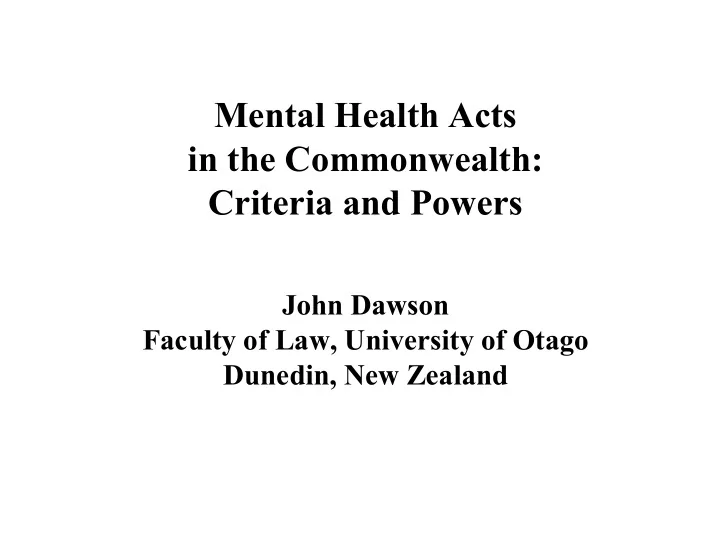

Mental Health Acts in the Commonwealth: Criteria and Powers John Dawson Faculty of Law, University of Otago Dunedin, New Zealand
The Usual Contents of a Mental Health Act • The standards (or criteria) governing compulsion • The process for civil commitment • Administrative structure and statutory roles • Powers to detain and treat patients without consent • Powers to control patients in the community • Independent review procedures (eg, via MHRT) • Patients’ rights and advocacy services • Intersections with the criminal justice system • The role of Guidelines (or a Code of Practice)
Agenda for this Talk • Some aspects of the civil commitment process • Two aspects of legal standards governing compulsion • Mandatory peer review of treatment without consent • Powers conferred by Community Treatment Orders
Some aspects of the process, in modern MHAs • A compulsory assessment period (eg, 1 month), before longer-term decisions are made • Mandatory family consultation • A mandatory hearing before a court or tribunal (not just a hearing on application) • All compulsory treatment orders have a limited term: eg, 6m, then may be renewed • Thus clinicians must periodically re-justify coercion • Clinicians and review bodies must release the person whenever the criteria for compulsion no longer apply
Standards for Compulsion: usually 3 or 4 elements 1. Severe ‘mental disorder’ or ‘mental illness’ 2. Danger to self or others, or gravely disabled 3. No less restrictive alternative (4. Lack of capacity to refuse psychiatric treatment)
Should ‘mental disorder’ be defined more fully? 1. A common approach: broad and vague definition eg, ‘mental disorder’ means ‘any disorder or disability of the mind’: MHA 1983 (England and Wales) (amended in 2007) 2. The Australasian approach: – listing specific disorders of part-function of the mind: ‘abnormal state of mind characterised by delusions, or disorder of mood, perception, volition or cognition’: – New Zealand’s MHA 1992
Reasons to define ‘mental disorder’ more fully 1. To reduce discretion, inconsistency, ‘arbitrariness’ – providing a better foundation for independent review 2. To define mental disorder by reference to abnormal mental function , not disordered behaviour alone Aubrey Lewis, ‘Health as a social concept’, (1953) 4 Brit J Sociology 109: “For illness to be inferred, disorder of function must be detectable at a discrete or differentiated level.”
Should the criteria for compulsion include ‘ incapacity to refuse psychiatric treatment ’ ? eg, in Saskatchewan (province of Canada), under Mental Health Services Act, section 24.3(1)(a)(v), for compulsory care, the person must be: unable to “ understand and make informed decisions ” about their “ need for treatment or care and supervision ” .
An alternative approach is to follow the rule that: • a person can be detained under the MHA, when mentally disordered’ and a ‘danger to self or others’ BUT • cannot be treated without consent without also being found to lack the capacity to consent >>> creating a detention/treatment split
The mandatory peer review (second opinion) process in England and NZ Patient under MHA won’t/can’t consent to treatment • Medication: > 2 or 3 months Responsible Clinician (RC) proposes • ECT: at any time treatment plan Second Opinion Approved Psychiatrist (SOAD) peer reviews Rx plan • The treatment plan is reviewed Is treatment in patient’s best interests? by senior clinicians, not by a Y N court or tribunal Treatment plan Treatment plan not approved approved ? Treatment give n
Powers under Community Treatment Orders Some mix of: • a duty placed on the patient to accept treatment • to accept visits and attend outpatient appointments (• power to enter private home, for treatment purposes) • power to specify the ‘level’ of accommodation (eg, ‘24 hr nursing cover’), but not ‘house arrest’ • swift recall to hospital, by responsible clinician • police assistance in recall process, when requested • compulsory reassessment in hospital • treatment without consent in hospital (or clinic?) • no ‘forced medication’ in the community
Victorian CTO Guidelines (2001) (at 13). ‘It is not acceptable to use physical force to impose treatment in any community setting. ‘Similarly, it is not acceptable to use the presence of others (especially Police) to coerce a person to take treatment in the community. ‘If such a degree of force or coercion is considered necessary … the [order] should be revoked, whereafter the person must be admitted to an inpatient unit. ‘This allows … reconsideration of their clinical state, treatment needs, and treatment regime.’
Power to Treat Under a CTO Mental Health Act 2007 New South Wales, section 57(3): Medication may be administered without consent, outside hospital: ‘if it is administered without the use of more force than would be required … if the person had consented’.
Conclusion Controversy continues about: • details of the civil commitment process • the legal criteria for compulsion • the detention/treatment split • the value of mandatory peer review of treatment • the powers conferred by CTOs
Recommend
More recommend